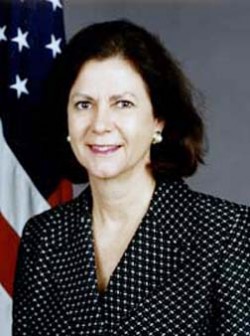When Roger Khan was nabbed in Suriname he was held with a horde of mobile instruments and two satellite phones which apparently enabled Paramari-bo security forces to track him with the help of US equipment.
In local circles, Khan spying on criminals is much talked about but it would appear that he became careless and was hunted down in June, 2006 by Suriname authorities using sophisticated equipment provided by Washington.

In a cable sent from Paramaribo, Suriname to Washington, then US Ambassador Marsha Barnes said that when Khan was captured “he was found with 33 cell phones, 2 satellite phones, and a powerful laptop, which would suggest technical sophistication.” Barnes was answering questions from Washington on links between Khan and then Surinamese opposition figure and now President Desi Bouterse. The powerful laptop could have been the second of two cell phone tracking machines that Khan was thought to have had.
Barnes in a separate cable had noted that Surinamese newspaper De Ware Tijd had reported that technology, donated by the US Embassy, was used to arrest Khan. She quoted the report as stating that “local authorities used satellite technology to trace Khan’s exact location and tap his phone calls (Khan was using a satellite phone) and the Surinamese authorities were monitoring Khan’s calls even before he fled to Suriname” from Guyana.
In this cable Barnes also described as “odd” an enquiry by a Surinamese TV station as to whether there had been a meeting between Khan and US embassy officials at the Ocean View Hotel. Barnes would have likely been unaware that there was such a meeting in Guyana between Khan and US embassy officials.
As part of the series of questions asked by Washington about Bouterse and Khan, Barnes related that according to the Surinamese Justice Minister C Santokhi, Khan had travelled to Suriname on a “regular basis” over the last year (2005-06). She added that “police know of two Khan visits to Paramaribo in the last year.
“Police know that Khan has also visited Bouterse’s property located near Wasjabo, a village that sits on the Corantijne River not far from the town of Apoera on the Guyanese-Surinamese border, but do not know of dates or times. Out of Washabo is likely where Bouterse crosses into Guyana, as there are no border controls in the isolated location.
According to the Attorney General, Bouterse has also met with Khan in the western town of Nickerie.”
Barnes in a later cable also gave insights into Surinamese concerns that a plot engineered by Guyanese was afoot to free Khan from jail and also what the Surinamese thought about the capture and subsequent deportation of the Guyanese drug lord.
In a July 6, 2007 cable out of Paramaribo, Barnes related Santokhi’s concerns about the plot to free Khan.
She said De Ware Tijd had published an interview with then Attorney General Subhas Punwasi in which he revealed for the “first time that he had ordered an investigation into attempts by members of Khan’s criminal network to free him from custody. Mr. Punwasi said that a prison guard was offered a bribe (of) $500,000 USD to facilitate a breakout attempt.”
Barnes cable added that “Immediately after being offered the bribe the officer notified his superiors and as a result, the authorities were able to enhance security. The AG said that his office knows who approached the prison guard and that the source of the money was from Guyanese criminal circles, but a Surinamer offered it to the guard. The investigations also revealed that these Guyanese criminals also had detailed drawings of the Santo Boma Prison where Khan was being held,“ Barnes’ cable read.
She said that the AG further explained that “immediately upon learning of the attempt to free Khan plans were made to deport him. For security reasons, and realizing the extent of Guyanese involvement, it was decided not to transport Khan overland.
Simply moving him around Paramaribo in a vehicle was difficult which led to the decision to give Khan’s attorney access to him at prison rather than allow him to travel to the Court of Justice for an interview.“
Barnes also related to Washington what Surinamese were saying about Khan. She said that The Times of Suriname published the results of an opinion poll conducted on July 5 by a respected
Surinamese polling organization that showed broad support for Khan’s deportation.
“The Institute of Development Oriented Studies [IDOS, an independent polling group affiliated with Suriname’s sole University.] polling results indicate that 47.9 percent of Surinamese approved of the deportation of Roger Khan, while 27.3 percent believe that it would have been better for the GOS to prosecute him in Suriname; 24.7 percent registered no opinion.
IDOS further found that 70 percent of the people polled believe that Khan is a criminal; with 53.8 percent responding that they understood the reason the GOS chose to deport him.
A minority of 18.3 percent said they were in agreement with statements made by Khan’s attorney, Mr. Erwin Kanhai, that U.S. agents kidnapped Khan. Of those sampled, 62.45 percent were of the opinion that Attorney General Subhas Punwasi had handled the matter properly in accordance with Surinamese law.”
Bin Laden
She said that this division of opinion was roughly echoed on July 6, 2006 in an unscientific “man in the street” opinion poll in which the newspaper Dagblad Suriname canvassed 8 people.
“Six out of 8 people approved of Khan’s deportation, with one even referring to him as ‘the second Bin laden.’ Of the two disagreeing with the government’s action, one thought he should have been prosecuted in Suriname and the other questioned his being a true threat to Suriname’s national security.
These two also believed Khan should have received better treatment from the officers who took him to the airport and one of the eight (still unconvinced of the government’s accounting of events) voiced his concern that Americans may have come on Surinamese soil to apprehend him.”





